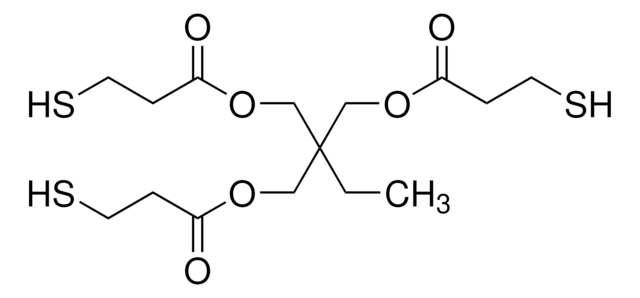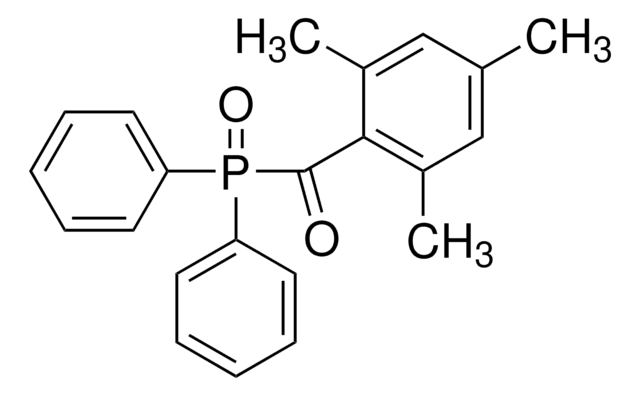Alle Fotos(2)
Wichtige Dokumente
466867
Polybutadien, überwiegend 1,2-Addition
approx. 90% 1,2-vinyl
Anmeldenzur Ansicht organisationsspezifischer und vertraglich vereinbarter Preise
Alle Fotos(2)
About This Item
Lineare Formel:
[CH2CH(CH=CH2)]n
CAS-Nummer:
MDL-Nummer:
UNSPSC-Code:
12162002
PubChem Substanz-ID:
NACRES:
NA.23
Empfohlene Produkte
Qualitätsniveau
Brechungsindex
n20/D 1.5002 (lit.)
Viskosität
30-100 poise(45 °C)(lit.)
Übergangstemp.
Tg −30 °C
Dichte
0.86 g/mL at 25 °C (lit.)
SMILES String
C=CC=C
InChI
1S/C4H8/c1-3-4-2/h3-4H,1-2H3/b4-3+
InChIKey
IAQRGUVFOMOMEM-ONEGZZNKSA-N
Verwandte Kategorien
Anwendung
- Transforming Polybutadiene with Tetrazine Click Chemistry into Antioxidant Foams That Fluoresce with Oxidation: This research uses tetrazine click chemistry to modify polybutadiene, enhancing its properties to create antioxidant foams that respond to oxidation with fluorescence, demonstrating innovative ways to utilize 1,2-addition polybutadiene (RE Bagge et al., 2017).
- Isoxazoline-based porous polymer for the highly effective adsorption of 2,4,6-trinitrotoluene (TNT): Catalyst-free click polymerization between an in situ generated nitrile oxide with polybutadiene. This article explores the enhancement of polybutadiene′s adsorptive properties for environmental cleanup applications, emphasizing how its structural characteristics affect performance (H Deng et al., 2020).
- Modification of polybutadiene with trifluoromethyl and clickable azide groups in one shot: This paper describes the simultaneous introduction of trifluoromethyl and azide functional groups into polybutadiene, showcasing the versatility of 1,2-addition polybutadiene in chemical modifications (S Wang et al., 2021).
Lagerklassenschlüssel
10 - Combustible liquids
WGK
WGK 3
Flammpunkt (°F)
Not applicable
Flammpunkt (°C)
Not applicable
Persönliche Schutzausrüstung
Eyeshields, Gloves, type N95 (US)
Hier finden Sie alle aktuellen Versionen:
Besitzen Sie dieses Produkt bereits?
In der Dokumentenbibliothek finden Sie die Dokumentation zu den Produkten, die Sie kürzlich erworben haben.
Gregory P Robbins et al.
Langmuir : the ACS journal of surfaces and colloids, 26(17), 14089-14096 (2010-08-14)
The polymersome, a fully synthetic cell mimetic, is a tunable platform for drug delivery vehicles to detect and treat disease (theranostics). Here, we design a leuko-polymersome, a polymersome with the adhesive properties of leukocytes, which can effectively bind to inflammatory
Joan M Widin et al.
Journal of the American Chemical Society, 134(8), 3834-3844 (2012-01-28)
Controlled/"living" polymerizations and tandem polymerization methodologies offer enticing opportunities to enchain a wide variety of monomers into new, functional block copolymer materials with unusual physical properties. However, the use of these synthetic methods often introduces nontrivial molecular weight polydispersities, a
P S Brown et al.
Langmuir : the ACS journal of surfaces and colloids, 28(38), 13712-13719 (2012-09-13)
Two-dimensional hexagonally ordered honeycomb surfaces have been created by solvent casting polybutadiene films under controlled humidity. Subsequent CF(4) plasmachemical fluorination introduces cross-linking and surface texturing, leading to hierarchical surfaces with roughness on both the 10 μm (honeycomb) and micrometer (texturing)
Anton Berthold et al.
Macromolecular rapid communications, 32(16), 1259-1263 (2011-06-22)
We present an efficient method for functionalizing the large polymer-air interface of a gyroid nanoporous polymer. The hydrophilicity of nanoporous cross-linked 1,2-polybutadiene is tuned by thiol-ene photo-grafting of mercaptosuccinic acid or sodium 2-mercaptoethanesulfonate. The reaction is monitored by FT-IR, UV-Vis
Nimi Gopalakrishnan et al.
Optics letters, 36(17), 3350-3352 (2011-09-03)
We demonstrate and describe how nanoporous liquid core waveguides can exclude scattering particles, making them an ideal integrated platform for analysis of turbid solutions. Milk with 0.5% fat showed an optical propagation loss of 0.05 dB/mm at 633 nm in nanoporous waveguides
Unser Team von Wissenschaftlern verfügt über Erfahrung in allen Forschungsbereichen einschließlich Life Science, Materialwissenschaften, chemischer Synthese, Chromatographie, Analytik und vielen mehr..
Setzen Sie sich mit dem technischen Dienst in Verbindung.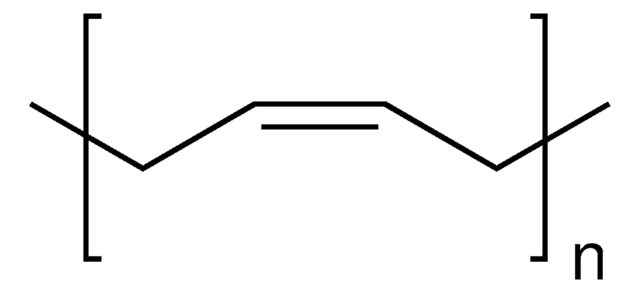
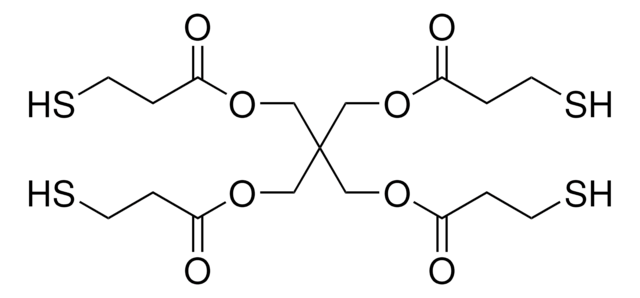
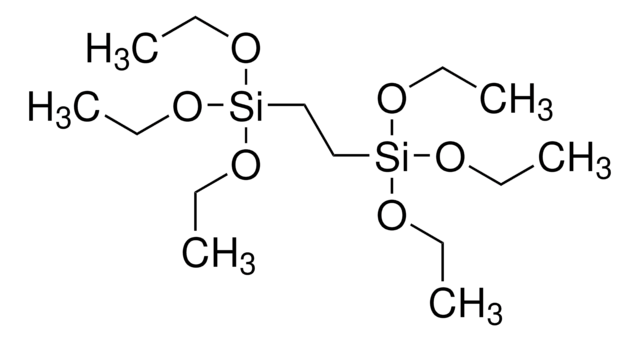
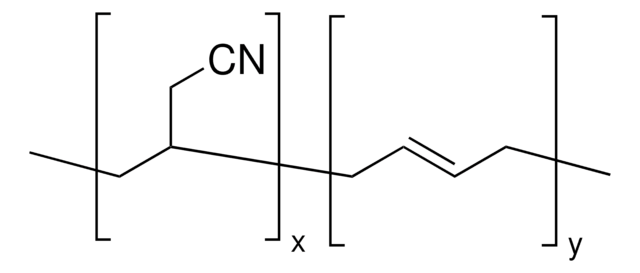
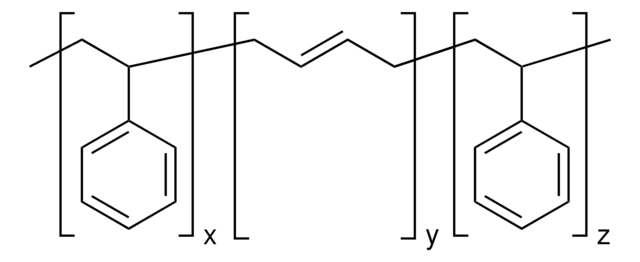
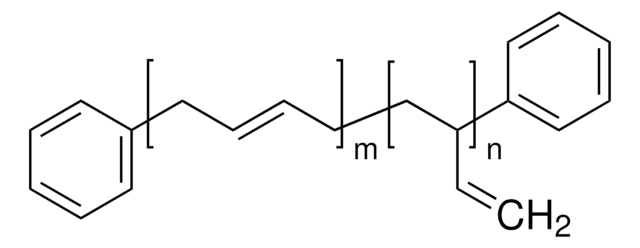
![Bis-[3-(triethoxysilyl)-propyl]-tetrasulfid technical, ≥90% (NMR)](/deepweb/assets/sigmaaldrich/product/structures/242/790/625f5cba-32bd-4acf-a3be-e119e9cf844f/640/625f5cba-32bd-4acf-a3be-e119e9cf844f.png)
